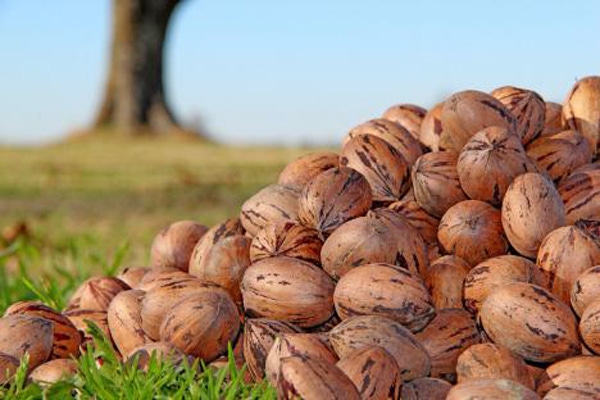
With pecan harvest in high gear across Texas, pecan specialists have updated their production estimates for the year indicating the state's total pecan crop may top out near or above the 60-million pound mark, the best production total in several years.
While pecans are grown all across the state, East Texas, where a substantial harvest is underway, once again leads the state in production early in the season.
Julian Amaya of Bullard reports a bumper crop from his 500-plus tree orchard and says others across the region are bringing in hefty crops as well. In addition to harvesting his own crop, Amaya shells pecans for other growers and says shelling operations have been exceptionally busy.
In addition to smaller Texas native varieties, Amaya also grows the larger desirable variety that is in high demand in commercial markets. He credits an exceptional year for rain combined with an on year for pecans as reasons behind this year's good harvest. Pecan production naturally follows an on-year/off-year production cycle because of the amount of energy the trees must produce to develop good pecans.
For the latest on southwest agriculture, please check out Southwest Farm Press Daily and receive the latest news right to your inbox.
Texas A&M AgriLife Extension pecan specialist Monte Nesbitt explains a bumper crop one year generally indicates the following year's crop will be smaller as pecan trees struggle to recover energy from a good harvest. He says a pecan tree requires just the right mix of sun and water to develop that energy each year.
Substantial rainfall
The state's pecan industry has suffered in recent years as a result of severe drought conditions and Nesbitt indicates this year's early harvest report is good news for growers who have managed to weather multiple years of water shortages. Nesbitt says the better-than-expected harvest is primarily the result of substantial early summer and fall rains across the state, especially in Eastern parts of Texas.
Nesbitt says pecans are the No. 1 fruit crop in Texas in terms of acreage, but says the industry has suffered greatly in recent years. While growers managed to produce about 55 million pounds of pecans in 2012, last year's production fell short of 29 million pounds.
This year things are looking up. Not only have earlier Texas A&M Extension estimates risen from 50 to 55 million pounds to 60 million pounds or more, harvested nuts are reported to be of good to excellent quality. Successful marketing depends on the size and quality of the nut, especially for exports.
A growing international market for quality pecans has helped the industry survive a recent flat domestic market that suffered from fewer pecans and higher retail prices. China remains a major importer of Texas pecans and more international markets are being developed in the Middle East and India.
Blair Krebs with the Texas Pecan Growers Association says while production is up across the state, so is demand, the perfect combination for a successful crop year. She says smaller production numbers in recent years forced prices higher, which served to drive demand lower. This year's larger crop will help to steady prices, but she warns nut size nationwide may be an unexpected variable.
While Georgia likely will produce the largest pecan crop again this year, New Mexico and Texas are expected to rank as second and third in total production, respectively. USDA estimates New Mexico will provide about 65 millions pounds of nuts this year with Texas not far behind.
While rains have been beneficial and timely across many pecan production regions in Texas, Nesbitt says usual problems like pests and diseases have also been on the rise in some areas. Proper tree care and integrated pest management have helped minimize those problems.
Pecan harvest will continue in Texas into 2015 for some late-developing varieties.
About the Author(s)
You May Also Like




